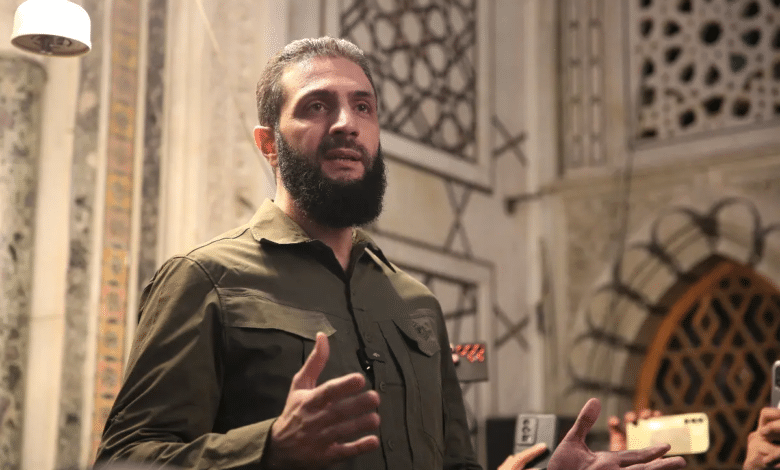
Syrian rebel leader Ahmed al-Sharaa has stated in a recent interview with the BBC that Syria does not pose a threat to the world
Syrian rebel leader Ahmed al-Sharaa has stated in a recent interview with the BBC that Syria does not pose a threat to the world, countering narratives that the country remains a significant danger beyond its borders. His remarks come as Syria continues to struggle with the aftermath of a brutal civil war, ongoing regional instability, and international isolation.
Key Points of Ahmed al-Sharaa’s Statement
- Syria’s Internal Focus:
- Al-Sharaa emphasized that Syria’s current challenges are predominantly internal, with the nation grappling with:
- Decades of conflict and destruction.
- A humanitarian crisis affecting millions of Syrians.
- Efforts by various factions to stabilize regions under their control.
- Al-Sharaa emphasized that Syria’s current challenges are predominantly internal, with the nation grappling with:
- Counter to International Concerns:
- Al-Sharaa rejected assertions that Syria poses an international threat, particularly in terms of terrorism or geopolitical instability.
- He argued that global powers should focus on aiding Syria’s reconstruction and supporting peace efforts rather than isolating the country.
- Opposition to Assad Regime:
- As a prominent figure in the opposition movement, Ahmed al-Sharaa has consistently criticized the regime of President Bashar al-Assad for perpetuating the conflict.
- He called for political reforms and an end to authoritarian governance, framing these changes as key to Syria’s long-term stability.
- Appeal for International Support:
- Al-Sharaa urged the international community to re-engage with Syria through humanitarian aid, reconstruction projects, and diplomatic efforts.
- He warned that continued isolation could deepen suffering and fuel extremism among disenfranchised groups.
Global Perceptions of Syria
- Western Concerns:
- Western nations, particularly the United States and members of the European Union, view Syria as a potential threat due to:
- The presence of terrorist groups like ISIS and al-Qaeda affiliates.
- Iranian-backed militias and Hezbollah, whose activities have implications for regional security, particularly for Israel.
- Western nations, particularly the United States and members of the European Union, view Syria as a potential threat due to:
- Refugee and Humanitarian Crisis:
- Syria’s conflict has generated over 6.8 million refugees and millions of internally displaced persons, creating ongoing challenges for neighboring countries and Europe.
- There are fears that a failure to stabilize Syria could drive new waves of migration.
- Geopolitical Influence:
- Syria remains a battleground for regional and global powers, including Russia, Iran, Turkey, and the United States.
- Continued instability in Syria is seen as a factor in broader regional tensions and power struggles.
Rebel Leader’s Perspective vs. Realities
- Limited Control:
- Al-Sharaa’s statements reflect the perspective of rebel-held territories, which do not encompass the entire country.
- The Assad regime, supported by Russia and Iran, still controls most of Syria’s population centers.
- Fragile Ceasefires:
- Regions held by opposition forces remain under threat from ongoing military operations and airstrikes by the Assad regime and its allies.
- The precarious balance of power within Syria means that conflict could flare up again, affecting regional stability.
- ISIS Resurgence:
- While ISIS has been largely defeated as a territorial entity, cells continue to operate in parts of Syria, posing risks of resurgence and destabilization.
International Reaction
- Calls for Dialogue:
- Some international actors advocate for renewed peace talks and an inclusive political solution to end Syria’s conflict.
- Cautious Engagement:
- Countries like the UAE and Saudi Arabia have cautiously re-engaged with the Assad regime, suggesting a shift toward pragmatic diplomacy.
- Sanctions and Reconstruction:
- Western sanctions remain a hurdle for Syria’s reconstruction, with debates continuing over how to balance accountability for human rights abuses with the need for humanitarian assistance.
Conclusion
Ahmed al-Sharaa’s assertion that Syria does not pose a global threat highlights a desire for international engagement and a focus on rebuilding the war-torn nation. However, the realities of regional instability, the Assad regime’s alliances, and the presence of extremist groups continue to shape global perceptions of Syria. Resolving these challenges remains crucial for achieving peace and stability in the region.
